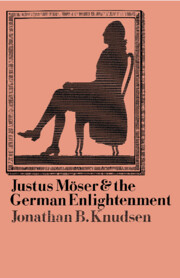Book contents
- Frontmatter
- Contents
- Preface
- Acknowledgments
- Abbreviations
- 1 Justus Möser in the German Enlightenment
- 2 Möser's social universe: urban notability and Enlightenment intelligentsia
- 3 Möser's political universe: secular politics in a confessional state
- 4 Moser's historical universe: regional history and cosmopolitan history
- 5 The party of incremental movement: social and economic reform in Möser's Osnabrück
- 6 Möser's social theory: local patriotism and the defense of the estates
- 7 The dialectic of Enlightenment: the debate over theory and practice
- Bibliography
- Index
7 - The dialectic of Enlightenment: the debate over theory and practice
Published online by Cambridge University Press: 17 September 2009
- Frontmatter
- Contents
- Preface
- Acknowledgments
- Abbreviations
- 1 Justus Möser in the German Enlightenment
- 2 Möser's social universe: urban notability and Enlightenment intelligentsia
- 3 Möser's political universe: secular politics in a confessional state
- 4 Moser's historical universe: regional history and cosmopolitan history
- 5 The party of incremental movement: social and economic reform in Möser's Osnabrück
- 6 Möser's social theory: local patriotism and the defense of the estates
- 7 The dialectic of Enlightenment: the debate over theory and practice
- Bibliography
- Index
Summary
In the decades before the French Revolution, the “party of reform” accommodated a variety of views: in those years an ambiguous compromise still seemed credible between the head and the heart, between the reform ideals of the Enlightenment and the political realities of corporate society. Reform did not mean revolution, and it was still possible to believe in gradual reform, without subscribing to the disruption of lawfully constituted institutions. But as has often occurred in periods of crisis, the moderate position eroded with the outbreak of revolution. From this point on Enlightenment began to be associated with political revolution, and all reform assumed revolutionary potential. As the cultural meaning of the Enlightenment became radicalized – and reified – so too did the interpretation of corporate society and its political institutions, producing a reasoned and systematic defense of hierarchy, law, and order.
Möser took part in this realignment in the years before his death in January 1794. This required little change in his views. In his last essays, we find the themes described in the previous chapter applied almost unchanged to the new revolutionary situation in France. He defended the system of Estates, inherited inequality, and even the historical rationality of serfdom – all in the rationalistic language of contract theory. In this way, his entire ouevre and long public life became a coherent critique of the French Revolution and the radical Enlightenment.
- Type
- Chapter
- Information
- Justus Möser and the German Enlightenment , pp. 164 - 186Publisher: Cambridge University PressPrint publication year: 1986

